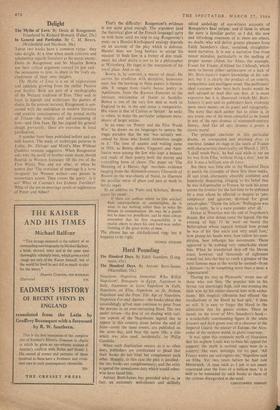Delight
The Myths of Love. By Denis de Rougemont.
Translated by Richard Howard. (Faber, 25s.) In General and Particular. By C. M. Bowra.
(Weidenfeld and Nicolson, 30s.)
THESE two books have a common virtue: they take delight. At a time when much criticism and scholarship regards literature as the secret enemy, Denis de Rougemont and Sir Maurice Bowra use their critical argument toward its just end: the persuasion to love, to share in the lively en- chantment of their own insights.
The Myths of Love is a set of explorations' and addenda growing from the earlier Passion and Society. Both are part of a mythography of the Western tradition of Eros. They seek to trace in legends and archetypes the poetics of desire. In the present instance, Rougemont is con- - cerned with the realisation in modern literature and creative consciousness of the primal myths of Tristan—the totality and self-consuming of love—and Don Juan. He has argued his general design previously; these are exercises in local justification.
A number have been published before and are well known. The study of archetypal patterns in Lolita, Dr. Zhivago and Musil's Man Without Qualities remains suggestive. When Rougemont asks why the motif of brother-sister incest should flourish in Western literature till the eve of the First World War and not after, or when he asserts that 'The eroticism of marriage is a terra incognita' for Western writers—one pauses in momentary assent. Then comes the query: is it so? What of Cocteau's Les Enfants Terribles? What of the sex-in-marriage revels or nightmares of Pinter and Albee? That's the difficulty: Rougemont's evidence is not quite good enough. The argument (and the rhetorical glow of the French language) carry us with them, until we stop to nag. Rougemont's essay on a Hamlet-Kierkegaard analogy depends on an account of the play which is dubious. Hamlet does not 'long hesitate to accept his mission' (it finds him in a frenzy of dim readi- ness); his chief desire is not to be a philosopher at Wittenberg. He rages at the usurpatidn of his royal place. And so on.
Bowra is, by contrast, a master of detail. He carries his erudition with deceptive, humorous ease; but the learning in these papers is formid- able. It ranges from Gaelic heroic poetry to Apollinaire, from the Russian Futurists to the
intricate relationship of Dante to Sordello. Bowra is one of the very few men at work in England to be, in,the real sense, a comparatist. His vision is that of Curtius or Spitzer : he seeks to relate, to make the particular judgment meta- phoric of larger unities.
In an essay on 'Poetry and the First World War,' he draws on six languages to sustain the tragic paradox that the war 'was actually wel- comed by those who found themselves caught in it.' The time of nausea and waking came in 1916; as Bowra shows, Ungaretti and Apol- linaire were among the few who kept a balance and made of their poetry both the mirror and controlling form of chaos. The paper on The Meaning of a Heroic Age' marshals evidence
ranging from the thirteenth-century Chronicle of Rostov to the war-chants of Natal, to illustrate the peculiar sense of place and past at work in heroic sagas.
In an address on 'Poets and Scholars,' Bowra states his creed :
If there are authors whom he fthe scholar]
finds unsympathetic or unintelligible,' he is wiser to say nothing rather than to voice his distaste in condemnation. He may be a pundit but he must not pontificate, and he must always remember that his first responsibility is to enable others to share his own hard-won under- standing of the great works of men.
The phrase has an old-fashioned ring; but it happens to be right.
GEORGE STEINER


































 Previous page
Previous page